News

From Saleng to factories: Vulnerabilities & limitations of the recycling business
Prachatai 24 February 2021 | Yiamyut Sutthichaya
A look at the recycling industry in Thailand from top to bottom. Despite its important role in recycling waste in the country, it still faces various limitations and vulnerabilities that are only understood by those on the inside.

Locals voice protest against gold exploration in Chanthaburi province
Thai PBS World 10 February 2021
A network of about 40 civic groups and local organizations in Thailand’s eastern province of Chanthaburi is voicing strong opposition to the granting of approval for gold exploration by a mining company.

Factories to monitor emissions
Bangkok Post 29 January 2021 | Lamonphet Apisitniran
Up to 600 factories nationwide are being ordered to closely monitor their emissions to better curb air pollutants as the Industry Ministry steps up efforts to cope with PM2.5 ultra-fine dust, now blanketing most parts of Bangkok.
The mandatory requirement, with a maximum fine of 200,000 baht for violators, will be enforced under a new ministerial law expected to take effect next year, according to the ministry.

Cancer-causing baby powders continue circulating in the Nepali market
Rising Nepal Daily 24 January 2021 | Binu Shrestha
Baby powders, one of the most widely used cosmetics, are alleged to contain cancer-causing asbestos. Several investigations and scientific researches provide evidence after evidence that exposure to asbestos-tainted talcum powder may cause malignant mesothelioma, a rare and deadly cancer that affects tissues lining internal organs.

Dirty recycling in Thailand destroys the environment and the livelihood of local people. Register of polluters and “right to know” can change this
PRESS RELEASE | 29 December 2020
BANGKOK/PRAGUE – The Pollution Control Department has lately stepped up for a decisive legal action against the polluting factory Win Process Company. This comes after a decade of numerous complaints about the impacts of leaked toxic chemicals that polluted the local farmland and crops in Nong Phawa, Ban Khai District, Rayong Province, Thailand. The pollution had very negative effects on the livelihood of local communities. This case shows that it is necessary to demand for Pollutant Release and Transfer Register[1].

Finally, a win for villagers
Bangkok Post 26 December 2020
After years of fighting for environmental justice, the efforts of Ratchaburi villagers who suffered contamination from a waste recycling firm have finally paid off. The Civil Court on Thursday handed down a landmark verdict in their favour, ordering the firm to pay millions of baht in compensation.

Locals secure victory over plastics firm
Bangkok Post 25 December 2020
Company to restore damaged areas
Residents of a village in tambon Nam Phu of Ratchaburi's Muang district have won a court battle with a plastic recycling company that was found to have polluted the local environment which negatively impacted their health.

Citizen Science Vital for Protecting Community Health from Chemicals and Wastes
Press Release | 26 November 2020
Bali, Indonesia/Bangkok, Thailand/Manila, Philippines. Experts from various fields and institutions cited the tremendous potentials of citizen science for advancing public participation in research efforts that can generate data, which can increase the negotiation power of communities facing chemical and waste pollution.

Efforts to Clear the “World’s Trash Bin”: Hazardous Waste Challenges in Thailand and beyond
Bangkok Tribune 18 November 2020 | Mali Hom-ngern
In spite of the fact that Thailand is gearing towards the next era of its industrial development, with the Thailand 4.0 policy being promoted as the flagship, its hazardous waste management is said to have stood still at the era of 80s to 90s, resulting in a number of hurdles in hazardous waste management that can barely keep up with the rising challenges at the moment, the Dialogue Forum 7 was told.

Citizen science new tool to empower vulnerable communities
Manila Bulletin 04 November 2020 | Ellalyn De Vera-Ruiz
Environment advocates are making use of citizen science as a unique opportunity for vulnerable communities to empower themselves with data and information amid the threats of chemical wastes to health and environment.
“Through the years, citizen science has developed into a practical and potent tool for helpless victims who often suffer in silence from the destructive pollution caused by powerful commercial and industrial interests,” Penchom Saetang, EARTH executive director and a citizen science practitioner for over 20 years, said in a statement.


